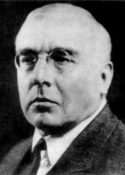
Gurdjieff International Review
P. D. Ouspensky
(1878–1947)
by John Pentland
Ouspensky’s Tertium Organum, written in 1911, was published in New York in 1922 and within a few years became a best-seller in America and made him a world-wide reputation. Intended to supplement the Organon of Aristotle and the Novum Organum of Francis Bacon, Tertium Organum is based on the author’s personal experiments in changing consciousness; it proposes a new level of thought about the fundamental questions of human existence and a way to liberate man’s thinking from it’s habitual patterns. A New Model of the Universe, a collection of essays published earlier in Russia, was published in London in 1930. But Ouspensky will be chiefly remembered for In Search of the Miraculous, published posthumously in 1949 and later in several foreign languages under the title Fragments of an Unknown Teaching. This work is by far the most lucid account yet available of the teaching of G. I. Gurdjieff, and it has been a principal cause of the growing influence of Gurdjieff’s ideas.
Ouspensky was born in Moscow and spent his childhood there. His mother was a painter. His father, who died early, had a good position as a railroad surveyor; he was fond of music, in which Ouspensky showed no interest. Of precocious intelligence, Ouspensky left school early with a decision not to take the academic degrees for which he was qualified and began to travel and write. Through his reading and journalistic work, first in Moscow and then, from 1909 on, in Saint Petersburg, he “knew everyone.” His early writings can be regarded as a final flowering of the great Russian literary tradition of the late nineteenth century. But, although influenced by such movements as the Theosophy of H. P. Blavatsky (whom he never met), he distrusted and disliked the “absurdities” of contemporary life and kept apart from the secret revolutionary politics with which almost all Russian intelligentsia of the period sympathized.
In 1915, returning to Russia from India to find that war had broken out in Europe, he gave lectures on his “search for the miraculous” and attracted large audiences in Saint Petersburg and Moscow. Among his listeners was Sof’ia Grigor’evna Maksimenko, who became his wife. They had no children.
In the same year, he was sought out by the pupils of Gurdjieff and reluctantly agreed to meet him. The meeting was a turning point in Ouspensky’s life. He recognized at once the value of the ideas that Gurdjieff had discovered in the East and that he himself had looked for in vain. “I realized,” he wrote, “that I had met with a completely new system of thought, surpassing all I knew before. This system threw a new light on psychology and explained what I could not understand before in esoteric ideas.” He began to collect people and to arrange meetings at which Gurdjieff developed his message, and from that moment the study and practice of these new ideas constituted Ouspensky’s principal aim.
In June 1917, after four months’ service in the army, from which he was honorably discharged on account of poor eyesight, the impending revolution caused Ouspensky to consider leaving Russia to continue his work in London. But he delayed his departure to spend nearly a year in difficult political conditions with Gurdjieff and a few of his pupils at Essentuki in the northern Caucasus.
As early as 1918, however, Ouspensky began to feel that a break with Gurdjieff was inevitable, that “he had to go”—to seek another teacher or to work independently. The break between the two men, teacher and pupil, each of whom had received much from the other, has never been satisfactorily explained. They met for the last time in Paris in 1930.
In 1919 Ouspensky and his family remained in very harsh conditions in the hands of the Bolsheviks in Essentuki (see Letters from Russia, 1978). He assembled some students there but in 1920, when Essentuki was freed by the White Army, moved to Constantinople. In August 1921 he was able to leave for London, and in November, with the help of Lady Rothermere, A. R. Orage, and other influential people, he started private meetings and lectures there. These continued until 1940, after the outbreak of World War II, when he moved his family to the United States and, with a few London pupils, began his lectures again in New York. Early in 1947 he returned to resume his work in London, where he died in October of the same year.
A characteristic of every one of Ouspensky’s meetings, which he attended until a few months before his death, was their remarkable intensity. He made demands for the utmost honesty not only on himself but on his pupils as well. His method was to invite “new people” to listen to five or six written lectures read aloud by one of the men close to him. (These lectures were published in 1950 as The Psychology of Man’s Possible Evolution.) Further understanding of the ideas had to be extracted from him directly by question and answer. Irrelevant questions were treated summarily. Simple rules, which to some appeared arbitrary, but which Ouspensky considered essential to self-training, were introduced—and explained at rare intervals. Pupils who wished further application of the training were invited to his country house in New Jersey, where practical work was organized by Madame Ouspensky. Transcripts of all the meetings are preserved in the P. D. Ouspensky Memorial Collection at the Yale University Library.
All of Ouspensky’s principal works are available in English, translated and/or edited by various hands and issued by various publishers in London and New York. Among them are:
|
Copyright © 1987 Macmillan Publishing Company a Division of Macmillan, Inc. This webpage © 1999 Gurdjieff Electronic Publishing Featured: Winter 1998/1999 Issue, Vol. II (2) Revision: January 1, 1999 |